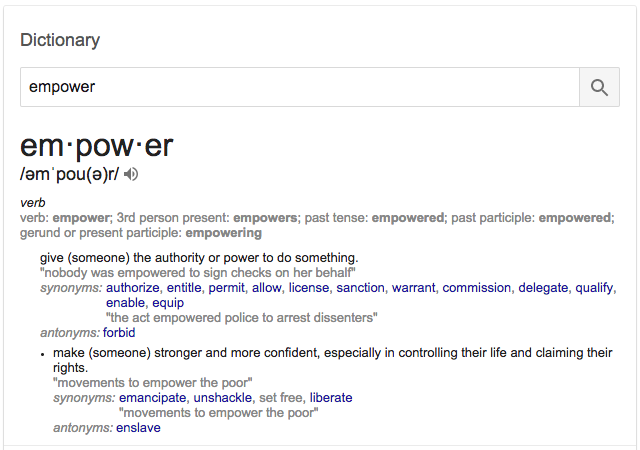We need to move past 'empowerment'
This word has left a bad taste in my mouth for some time now.
I have limited my use of it purposely - only using it in circumstances in which I felt it added a certain gravitas to my words. And even then I am frustrated at myself for resorting to it's use.
'Empowerment' has become a buzzword and has been for some time. It's used often in response to gender equality initiatives where every industry from international development to news media use it with a vengeance. UN Women have developed a set of Women's Empowerment Principles while Huffington Post has a whole section dedicated to empowerment in the form of articles titled Advice Column: How To Get Closure When Your Ex Is A No-Show, and similar.
While I acknowledge that the word 'empowerment' is used with the best of intentions and in many cases might even be creating some meaningful impact for gender equality, this word and it's connotations still doesn't fit quite right with me. After months of reflecting, musing and wondering why, I think I finally have the answer and it lies partly in the very definition of the word.
The above definitions suggest that 'empowerment' is about GIVING power/authority/confidence/strength/rights to someone. The assumption here is that the person in question is LACKING said power/authority/confidence/strength/rights and therefore needs to be empowered.
Who decides that said person needs to be empowered? Who is doing the empowering? Does the group in question even want to be empowered? Who decides that empowerment is a good thing?
And herein lies my problem.
I feel like the word 'empowerment' creates an uneven power balance between those already considered empowered and those who need to be. If we're talking from a gender lens and considering female empowerment, the assumption here is that those who need empowering are women, hence those who are already empowered must be men. According to the definition above and to use the synonyms associated with 'empower' - it then must be men who authorise, entitle, permit, allow, license, sanction, warrant, commission, delegate, qualify, enable and equip women who (presumably) passively wait for empowerment. Who holds the power? Who is empowering who?
Secondly, this idea that women need (and want) empowerment is based on the assumption that women lack power. However, the women that I know are not merely sitting around waiting to be empowered - they are active forces of nature who go out and get what they want. While some are better at this than others, some struggle with societal norms and expectations and some could do with a frequent injection of confidence - all are capable, skilled, multi-talented women who command their own power and write their own happy endings. If that's not powerful, I don't know what is.
For gender equality to truly become a reality, I think we need to move past this idea of 'empowerment' which unfortunately paints women as powerless and passive, waiting on empowerment to be delivered on a silver platter. Instead we need to treat women and men as equal, to build societies and communities that are inclusive in which women can build their own confidence.
To quote Michele Jaret who writes on the same topic, here are some other things we can do to move past empowerment and work towards true gender equality:
Treat women as equals. Don’t point out their supposed insecurities only to offer them a solution for a price. Don’t portray them as one-dimensional. Don’t stereotype them. Don’t objectify them. Learn what this truly means. Speak to women as adults. Don’t lie to them. Understand that “different from you” doesn’t mean “needs help.” Don’t try to explain things to them. Learn how to truly listen. Be open to being wrong. Question your own opinions about women. Figure out why you personally feel the way you do about them. Learn to get comfortable with the feeling of a powerful woman in the room. Own your own insecurities around this, rather than using external power sources to diminish women. If you are hurt or in pain, find healthy ways to express and heal this. Examine your ideas of what power looks and sounds like. Understand that although the world we live in right now was created and designed by men, this doesn’t make it the best option. Face the reality that it’s not the best option, and commit to being part of the solution.
Do you have a similar problem with this word 'empowerment'?
Do you have a word (or phrase) you use in it's place?
This article was originally posted on LinkedIn. Click here to see original post.


